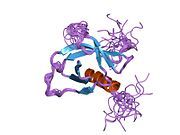FGD3
Appearance
(Redirected from FGD3 (gene))
FYVE, RhoGEF and PH domain-containing protein 3 is a protein that in humans is encoded by the FGD3 gene.[5][6]
See also
[edit]- FYVE, RhoGEF and PH domain containing
- FYVE domain (zinc finger domain)
- RhoGEF domain (with guanine nucleotide exchange factor activity)
- PH domain (pleckstrin homology domain)
References
[edit]- ^ a b c GRCh38: Ensembl release 89: ENSG00000127084 – Ensembl, May 2017
- ^ a b c GRCm38: Ensembl release 89: ENSMUSG00000037946 – Ensembl, May 2017
- ^ "Human PubMed Reference:". National Center for Biotechnology Information, U.S. National Library of Medicine.
- ^ "Mouse PubMed Reference:". National Center for Biotechnology Information, U.S. National Library of Medicine.
- ^ Hattori A, Okumura K, Nagase T, Kikuno R, Hirosawa M, Ohara O (Feb 2001). "Characterization of long cDNA clones from human adult spleen". DNA Res. 7 (6): 357–66. doi:10.1093/dnares/7.6.357. PMID 11214971.
- ^ "Entrez Gene: FGD3 FYVE, RhoGEF and PH domain containing 3".
Further reading
[edit]- Maruyama K, Sugano S (1994). "Oligo-capping: a simple method to replace the cap structure of eukaryotic mRNAs with oligoribonucleotides". Gene. 138 (1–2): 171–4. doi:10.1016/0378-1119(94)90802-8. PMID 8125298.
- Suzuki Y, Yoshitomo-Nakagawa K, Maruyama K, et al. (1997). "Construction and characterization of a full length-enriched and a 5'-end-enriched cDNA library". Gene. 200 (1–2): 149–56. doi:10.1016/S0378-1119(97)00411-3. PMID 9373149.
- Pasteris NG, Nagata K, Hall A, Gorski JL (2000). "Isolation, characterization, and mapping of the mouse Fgd3 gene, a new Faciogenital Dysplasia (FGD1; Aarskog Syndrome) gene homologue". Gene. 242 (1–2): 237–47. doi:10.1016/S0378-1119(99)00518-1. PMID 10721717.
- Strausberg RL, Feingold EA, Grouse LH, et al. (2003). "Generation and initial analysis of more than 15,000 full-length human and mouse cDNA sequences". Proc. Natl. Acad. Sci. U.S.A. 99 (26): 16899–903. Bibcode:2002PNAS...9916899M. doi:10.1073/pnas.242603899. PMC 139241. PMID 12477932.
- Ota T, Suzuki Y, Nishikawa T, et al. (2004). "Complete sequencing and characterization of 21,243 full-length human cDNAs". Nat. Genet. 36 (1): 40–5. doi:10.1038/ng1285. PMID 14702039.
- Humphray SJ, Oliver K, Hunt AR, et al. (2004). "DNA sequence and analysis of human chromosome 9". Nature. 429 (6990): 369–74. Bibcode:2004Natur.429..369H. doi:10.1038/nature02465. PMC 2734081. PMID 15164053.
- Gerhard DS, Wagner L, Feingold EA, et al. (2004). "The status, quality, and expansion of the NIH full-length cDNA project: the Mammalian Gene Collection (MGC)". Genome Res. 14 (10B): 2121–7. doi:10.1101/gr.2596504. PMC 528928. PMID 15489334.
- Kimura K, Wakamatsu A, Suzuki Y, et al. (2006). "Diversification of transcriptional modulation: large-scale identification and characterization of putative alternative promoters of human genes". Genome Res. 16 (1): 55–65. doi:10.1101/gr.4039406. PMC 1356129. PMID 16344560.
- Delague V, Jacquier A, Hamadouche T, et al. (2007). "Mutations in FGD4 encoding the Rho GDP/GTP exchange factor FRABIN cause autosomal recessive Charcot-Marie-Tooth type 4H". Am. J. Hum. Genet. 81 (1): 1–16. doi:10.1086/518428. PMC 1950914. PMID 17564959.
External links
[edit]- PDBe-KB provides an overview of all the structure information available in the PDB for Human FYVE, RhoGEF and PH domain-containing protein 3 (FGD3)






